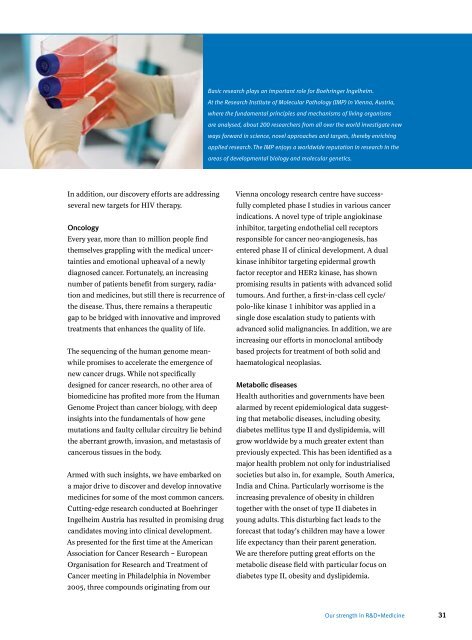Annual Report 2005 - Boehringer Ingelheim
Annual Report 2005 - Boehringer Ingelheim
Annual Report 2005 - Boehringer Ingelheim
You also want an ePaper? Increase the reach of your titles
YUMPU automatically turns print PDFs into web optimized ePapers that Google loves.
In addition, our discovery efforts are addressing<br />
several new targets for HIV therapy.<br />
Oncology<br />
Every year, more than 10 million people find<br />
themselves grappling with the medical uncer-<br />
tainties and emotional upheaval of a newly<br />
diagnosed cancer. Fortunately, an increasing<br />
number of patients benefit from surgery, radia-<br />
tion and medicines, but still there is recurrence of<br />
the disease. Thus, there remains a therapeutic<br />
gap to be bridged with innovative and improved<br />
treatments that enhances the quality of life.<br />
The sequencing of the human genome mean-<br />
while promises to accelerate the emergence of<br />
new cancer drugs. While not specifically<br />
designed for cancer research, no other area of<br />
biomedicine has profited more from the Human<br />
Genome Project than cancer biology, with deep<br />
insights into the fundamentals of how gene<br />
mutations and faulty cellular circuitry lie behind<br />
the aberrant growth, invasion, and metastasis of<br />
cancerous tissues in the body.<br />
Armed with such insights, we have embarked on<br />
a major drive to discover and develop innovative<br />
medicines for some of the most common cancers.<br />
Cutting-edge research conducted at <strong>Boehringer</strong><br />
<strong>Ingelheim</strong> Austria has resulted in promising drug<br />
candidates moving into clinical development.<br />
As presented for the first time at the American<br />
Association for Cancer Research – European<br />
Organisation for Research and Treatment of<br />
Cancer meeting in Philadelphia in November<br />
<strong>2005</strong>, three compounds originating from our<br />
Basic research plays an important role for <strong>Boehringer</strong> <strong>Ingelheim</strong>.<br />
At the Research Institute of Molecular Pathology (IMP) in Vienna, Austria,<br />
where the fundamental principles and mechanisms of living organisms<br />
are analysed, about 200 researchers from all over the world investigate new<br />
ways forward in science, novel approaches and targets, thereby enriching<br />
applied research. The IMP enjoys a worldwide reputation in research in the<br />
areas of developmental biology and molecular genetics.<br />
Vienna oncology research centre have success-<br />
fully completed phase I studies in various cancer<br />
indications. A novel type of triple angiokinase<br />
inhibitor, targeting endothelial cell receptors<br />
responsible for cancer neo-angiogenesis, has<br />
entered phase II of clinical development. A dual<br />
kinase inhibitor targeting epidermal growth<br />
factor receptor and HER2 kinase, has shown<br />
promising results in patients with advanced solid<br />
tumours. And further, a first-in-class cell cycle/<br />
polo-like kinase 1 inhibitor was applied in a<br />
single dose escalation study to patients with<br />
advanced solid malignancies. In addition, we are<br />
increasing our efforts in monoclonal antibody<br />
based projects for treatment of both solid and<br />
haematological neoplasias.<br />
Metabolic diseases<br />
Health authorities and governments have been<br />
alarmed by recent epidemiological data suggest-<br />
ing that metabolic diseases, including obesity,<br />
diabetes mellitus type II and dyslipidemia, will<br />
grow worldwide by a much greater extent than<br />
previously expected. This has been identified as a<br />
major health problem not only for industrialised<br />
societies but also in, for example, South America,<br />
India and China. Particularly worrisome is the<br />
increasing prevalence of obesity in children<br />
together with the onset of type II diabetes in<br />
young adults. This disturbing fact leads to the<br />
forecast that today’s children may have a lower<br />
life expectancy than their parent generation.<br />
We are therefore putting great efforts on the<br />
metabolic disease field with particular focus on<br />
diabetes type II, obesity and dyslipidemia.<br />
Our strength in R&D+Medicine 1

















